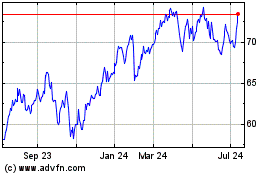Settlement with Finra is for allegedly failing to provide
information some clients needed
By Aruna Viswanatha and Leslie Scism
MetLife Inc., one of the best-known brands in life insurance,
misled tens of thousands of customers about a product that retirees
seek out for safety, according to regulators, who levied a
near-record $25 million fine against the company.
In a rare black eye for MetLife, a brokerage industry regulator
said MetLife failed to help customers properly compare old and new
versions of variable annuities, leading some clients to give up
versions of products that were cheaper and had more-generous
features than new ones.
The $25 million MetLife agreed to pay to settle the allegations
with the Financial Industry Regulatory Authority is the
second-largest fine Finra has ever levied. The largest, a $50
million penalty against Credit Suisse First Boston Corp. over
allegedly inflated commissions for hot initial public offerings,
was in 2002.
MetLife neither admitted nor denied the Wall Street watchdog's
findings, which concerned alleged violations between 2009 and 2014,
according to the settlement. In a statement, the company said in a
statement that it "fully cooperated with the FINRA
investigation."
Shares of MetLife, which is slated to report earnings Wednesday,
declined 2.3% to $44.79 on a rough day for financial stocks.
"This is kind of a perfect storm," Finra Chairman Richard
Ketchum said in an interview with The Wall Street Journal. He said
the investigation into MetLife found both "meaningful conflicts
with respect to fees," and "a consistent failure in supervision
with respect to clearly providing the information a customer
needs."
Mr. Ketchum said that while he didn't expect similar cases
against other firms, complicated products "have shown up as an area
of investor harm for a period of years." He added: "We continue to
see firms have problems managing their supervision with respect to
more complex products, whether those are structured products,
whether those are the more complex [exchange-traded funds] or
whether it's something like variable annuities."
Variable annuities, popular with older, risk-averse investors,
offer tax advantages to invest in stock and bond funds. For an
added fee at many insurers, investors can get lifetime payments of
a guaranteed-minimum amount even if the underlying funds perform
poorly.
Steep stock-market declines in the 2008 financial crisis exposed
the potential dangers of such generous guarantees to the insurers,
and by 2009 they were launching new, less-risky and more expensive
versions of the products.
Consumer advocates and other critics say agents, financial
advisers and others who are licensed to sell the products have a
financial incentive to urge consumers to replace an existing
variable annuity with a new one. That is because insurers typically
pay upfront commissions of 5% to 7% for the sales.
The Obama administration is counting on a new rule from the
Labor Department to address the problem. The so-called fiduciary
rule, which goes into effect next year, requires financial advisers
and others who sell investment products for retirement accounts to
act as fiduciaries, putting their clients' interest first.
According to the Tuesday settlement, MetLife sometimes
overstated the cost of a customer's existing variable annuity
contract, which in some instances increased a customer's cost by 2%
annually. The firm also sometimes failed to tell customers a
proposed replacement would reduce or eliminate features of their
existing variable annuity, Finra said.
Finra said it sampled some 35,500 applications that MetLife
representatives submitted for replacement contracts, and found that
72% -- or about 25,560 applications -- contained at least one error
that understated the value of the contract being replaced.
"The understanding of the advisers providing those
products...understanding the fees and what people were giving up
with respect to their existing contracts versus the ones they were
passing on...just wasn't there. And the error...occurred again and
again," Mr. Ketchum said.
MetLife sold at least $3 billion in variable annuities through
replacements between 2009 and 2014, and made $152 million in
commissions off the products, Finra said. It didn't have an
"adequate supervisory structure" that made sure brokers had
accurate information about the replacement products, the regulator
said.
The settlement includes a $20 million fine and $5 million to
reimburse customers, Finra said.
The problems cited by Finra at MetLife surprised many who know
the company. "They are one of the most compliance-centric insurers
in the industry," said Colin Devine, principal of insurance
consulting firm C. Devine & Associates. He noted that the
problematic sales cited by Finra are a small fraction of the more
than $50 billion in total variable-annuity sales by MetLife from
2009 to 2014.
Finra didn't accuse MetLife of promoting the replacements but
instead cited the company's failure to properly supervise the
replacement activity. It said that the company's registered
representatives weren't provided "adequate training or guidance on
how to conduct a comparative analysis" of products and that
"deficient systems and procedures" were evident.
The investigation dates back to March 2012, when MetLife fired
two New York brokers after receiving customer complaints that the
brokers had inappropriately transferred them into new variable
annuities.
Finra investigated the terminations and barred the two brokers
from the industry in 2014, according to regulatory records, saying
they had "carried out a scheme" for seven years to submit false
paperwork around putting customers into new retirement products, in
order to collect extra commissions they weren't entitled to.
As Finra investigator Kevin Link dug into the brokers' case, Mr.
Ketchum said, he realized the "numbers didn't add up," and
unearthed more systemic issues.
Mr. Ketchum said that investigators didn't find any evidence of
improper pressure to move customers into the new products, but that
there was an emphasis on the business. "There was clearly a
significant push to sell replacement products," he said.
Before recommending that a customer replace a variable annuity,
brokers are required to make sure the recommendation is suitable
for the customer and compare it with the customer's existing
contracts.
In November, MetLife had warned it may face a "significant fine"
from Finra over the issue. The insurer is in the process of
divesting its retail business as part of an effort to slim down and
respond to a shifting regulatory environment, and separately signed
an agreement in February to sell its sales force to Massachusetts
Mutual Life Insurance Co.
Write to Aruna Viswanatha at Aruna.Viswanatha@wsj.com and Leslie
Scism at leslie.scism@wsj.com
(END) Dow Jones Newswires
May 04, 2016 02:48 ET (06:48 GMT)
Copyright (c) 2016 Dow Jones & Company, Inc.
MetLife (NYSE:MET)
Historical Stock Chart
From Mar 2024 to Apr 2024

MetLife (NYSE:MET)
Historical Stock Chart
From Apr 2023 to Apr 2024
